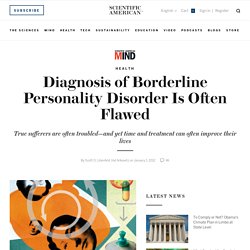

Diagnosis of Borderline Personality Disorder Is Often Flawed. THIS PAST JUNE renowned clinical psychologist Marsha M.

Linehan of the University of Washington made a striking admission. Known for her pioneering work on borderline personality disorder (BPD), a severe and intractable psychiatric condition, 68-year-old Linehan announced that as an adolescent, she had been hospitalized for BPD. Suicidal and self-destructive, the teenage Linehan had slashed her limbs repeatedly with knives and other sharp objects and banged her head violently against the hospital walls. The hospital’s discharge summary in 1963 described her as “one of the most disturbed patients in the hospital.” Yet despite a second hospitalization, Linehan eventually improved and earned a Ph.D. from Chicago’s Loyola University in 1971. Many psychologists and psychiatrists were taken aback by Linehan’s courageous admission, which received high-profile coverage in the New York Times. Once Borderline Always Borderline? BPD is not easy to treat. Diagnostic and Statistical Manual, Fifth Edition: Why will half the U.S. population have a mental illness?
Illustration by Robert Neubecker.

Beware the DSM-5, the soon-to-be-released fifth edition of the “psychiatric bible,” the Diagnostic and Statistical Manual. The odds will probably be greater than 50 percent, according to the new manual, that you’ll have a mental disorder in your lifetime. Although fewer than 6 percent of American adults will have a severe mental illness in a given year, according to a 2005 study, many more—more than a quarter each year—will have some diagnosable mental disorder. That’s a lot of people. Almost 50 percent of Americans (46.4 percent to be exact) will have a diagnosable mental illness in their lifetimes, based on the previous edition, the DSM-IV.
If we think of having a diagnosable mental illness as being under a tent, the tent seems pretty big. First, we’ve gotten better at detecting mental illness and doing so earlier in the course of the illness. Second, we really are getting “sicker.” Photo by Shannon Stapleton/Reuters. Attention Deficit Disorder (ADD and ADHD) - Psych Central.
An Introduction to ADHD in Adults By John M.

Grohol, Psy.D. Have you ever had trouble concentrating, found it hard to sit still, interrupted others during a conversation or acted impulsively without thinking things through? Can you recall times when you daydreamed or had difficulty focusing on the task at hand? Most of us can picture acting this way from time to time. Unlike a broken bone or cancer, attention deficit hyperactivity disorder (ADHD, also sometimes referred to as just plain attention deficit disorder or ADD) does not show physical signs that can be detected by a blood or other lab test*. The causes remain unknown, but ADHD can be diagnosed and effectively treated. Attention deficit disorder has been around a lot longer than most people realize.
Wondering if you might have ADHD? It's free, no registration required, and provides instant feedback. We've compiled this library of ADHD resources for you to explore. What is Generalized Anxiety Disorder? Social Anxiety Documentary: Afraid of People.